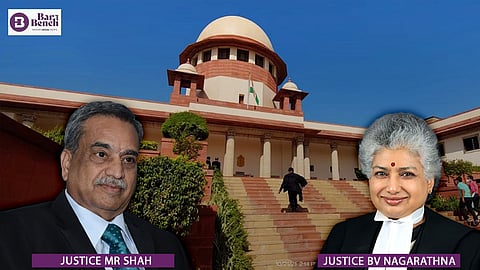Justice MR Shah, Justice BV Nagarathna and Supreme Court
News
[Service Tax case] Exemption provisions in tax statutes should be interpreted strictly: Supreme Court
A Division Bench of Justices MR Shah and BV Nagarathna was of the view that for the appellants in the case to take benefit of exemptions, they ought to fulfill all the relevant conditions laid down in the statute.
The Supreme Court on Wednesday reiterated that in a tax-related statute, statutory provisions providing for exemption have to be interpreted strictly and in light of words employed in them and there cannot be any addition or subtraction from such provisions [Krishi Upaj Mandi Samiti, New Mandi Yard, Alwar v. Commissioner of Central Excise and Service Tax, Alwar].

